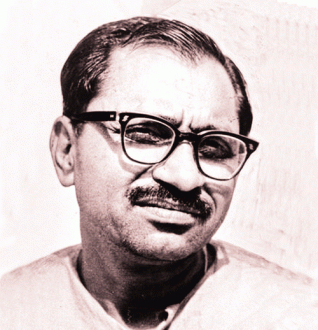A TRIBUTE TO DEENDAYAL UPADHYAYA
- By : Anirban Ganguly
- Category : Articles

In his centenary year, it is worthwhile to remember and pay tribute to the fact that it was primarily due to Pandit Deendayal Upadhyaya’s leadership that the Baharatiya Jana Sangh struck deep roots in the Indian political soil and spread across the country
In 2016, his centenary year, it is worthwhile to remember and pay tribute to the fact that it was primarily due to Pandit Deendayal Upadhyaya’s leadership, during a challenging and crucial phase, that the Baharatiya Jana Sangh struck deep roots in the Indian political soil and spread across the country. In shaping post-independent India’s political evolution and in imparting it a distinct direction, Upadhyaya’s contribution has been unparalleled and epochal. He joins the rank of Syama Prasad Mookerjee, BR Ambedkar, Ram Manohar Lohia and Jayaprakash Narayan as leaders who envisaged and aspired to shape an alternate polity and politics.
Yet, had it not been for the political party he worked to establish in India’s national life or for the Rashtriya Swayamsevak Sangh (RSS), to whose vision he had dedicated himself early in life with the aim of organising and re-vitalising the Hindu samaj, Upadhyaya would have been largely forgotten, subjugated by the multiple narratives that celebrated the one ‘Pandit’, who dominated Indian politics post-independence and whose legacy has been officially celebrated and patronised for decades.
Upadhyaya was essentially a political-philosopher, who brought back into the Indian public life and public lexicon, words that described the nation as a pulsating entity — an entity which possessed an identity-soul — chiti and whose frame was infused with virat, like the physical body was infused with prana. Just as prana infuses strength in various organs of the body, refreshes the intellect, and keeps body and soul together, argued Upadhyaya, “so also in a nation, with a strong virat alone, can democracy succeed and Government be effective.” Such articulations brought back into the post-independent Indian polity, a tone that was in consonance with her intrinsic civilisational temper and worldview. While articulating the inner layers of a nation and the civilisational faith in its sacrality, one did not see Upadhyaya hesitate or become apologetic.
Yet, such a deep analysis did not evolve out of a narrow or constricted reading of political philosophy and thought. Upadhyaya’s reading and his effort and quest in trying to understand the currents of world thought and the evolution of society and mankind’s aspirations for models of society and development, was impressive as it was wide and prolific. In his comparative analysis of two thinkers “Deendayal and Marx”, one of the avant-garde thinkers of the nationalist narrative, Dattopant Thengdi (1920-2004), for example, records Upadhyaya’s readings.
It must, however, be noted that Upadhyayaji was well conversant with all the thought-currents of the West. Apart from Marxism, (and different versions of revisionists — from Eduard Bernstein to Josip Broz Tito) he was very well acquainted with the direct or indirect social experiments of Robert Owen, Joseph Fourier and Étienne Cabet; theories of Saint Simon: Socialist militancy of Gracchus Babeuf; agrarian socialism of O’ Connor; proletarian socialism of O’ Brien, ‘minority conscience’ theory of Blauqui; evolutionary socialism of Louis Blanc: The ‘self-help’ doctrine of Schulze- Delitzsch; and ‘true socialism’ of the German trio, Bruno Bauer, Moses Hess, and Karl Grun. He had also studied Lassalle, Sismondi, Lamennais and Proudhon. He had critically analysed all the pre and post-Marxian European thought-systems ranging from capitalism to anarchism and including all the varieties of ‘socialism.’
While he exposed and immersed himself in examining the realm of Western thought and civilisational alternatives, Upadhyaya “had an additional advantage of being closely acquainted with different streams of traditional Indian thought. He had fully grasped the implications of the term ‘Dharma’ which is the characteristic gift of Hindu seers to humanity.” It was this training that led him to evolve an Indian matrix of political thought through which he would ceaselessly try and evaluate, re-evaluate and re-state the Indian position and direction.
By shaping a political philosophy that was essentially a quest to evolve a political framework and movement inspired by the Bharatiya civilisational ethos, Upadhyaya unleashed the possibilities of evolving a political discourse that was inspired by indigenous thought-roots of India. Unlike other political ideologies which had no roots in the Indian thought-evolution and which primarily derived inspiration from foreign frameworks and paradigms, the vision of integral humanism – or humanness, as propounded by Upadhyaya, sprung from the fountains of Bharatiya thought and aspirations. Post-independence, when models for India were being volubly debated often bordering on the raucous, when the dominant attitude was that of importing and grafting onto Indian conditions, models that were predominantly experimented with in the West, Upadhyaya displayed a spirit that was not overawed by the achievements or dominance of the West.
Instead, he chose to question, examine, analyse and weigh the viability, the success and the shortcomings of each proposition. He was not, as some have preposterously argued, opposed to Western science, instead he pointed out like many of his ideological and spiritual colleagues and mentors from the RSS, that while Western science was universal and needed to be absorbed if one were to move forward, the same could not be said to be true of the Western way of life and of its values. Upadhyaya refused to equate modernisation with Westernisation and in that, he was way ahead of his times and of the period when societies across the world would increasingly aspire to go back to their roots of identity which had seen gradual dilution due to a process of ‘modernisation’ read ‘Westernisation.’ The post-modern phenomena of seeking out the origins of identity and on that primal foundation to re-interpret and re-direct the march of collectivities was closely analysed by Upadhyaya long before the process had actually gained momentum and credence.
More importantly for the Indian contex, Upadhyaya spoke of dharma rajya, as a state, where inequality and divisiveness was eradicated. An economic system and a Government must be able to provide food, clothing and shelter and must “enable the individual to carry out his obligations to society by properly educating him” and in the event of “an individual falling prey to any disease, society must arrange for his treatment and maintenance” he argued. For him, a Government which was concerned with these was a Government which worked out the rule of dharma — otherwise it reflected the rule of adharma. Upadhyaya argued, basing himself on the Indian civilisational vision and framework of governance, that “Being responsible for the maintenance, protection and education of his subjects”, the ruler was their true father.

















